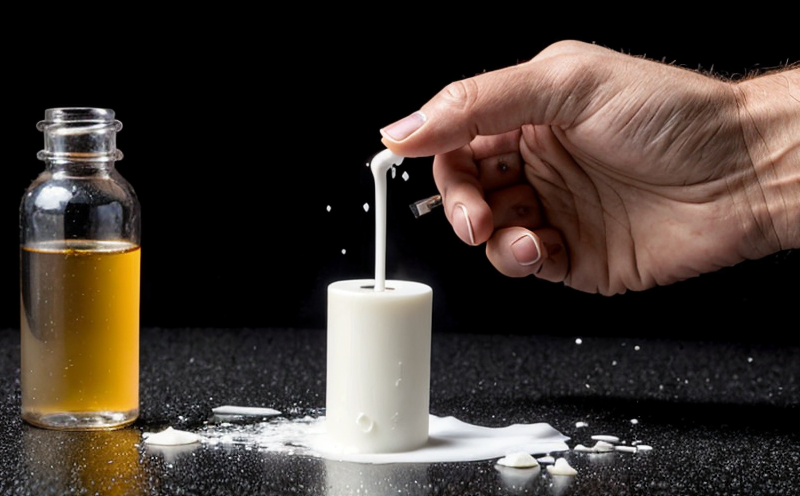USP Disintegration of Herbal Tablets Testing
The USP (United States Pharmacopeial Convention) Dissolution and Disintegration testing methods are critical for ensuring the quality, safety, and efficacy of pharmaceutical products. Specifically, the Disintegration Test is used to evaluate how quickly a tablet breaks down in a simulated stomach environment. This test ensures that tablets will dissolve properly when taken by patients, thus delivering the active ingredients effectively.
The USP 708 Disintegration Test is applicable to all dosage forms including those made of natural or synthetic materials. For herbal tablets, this test is particularly important as it helps ensure the integrity and bioavailability of the medicinal components within these formulations. Herbal extracts are often complex mixtures of various compounds, which can affect how quickly they disintegrate.
The testing process involves placing the tablets in a container filled with a specified volume of water or buffer solution at a controlled temperature. The container is then agitated for a set period of time to simulate conditions within the gastrointestinal tract. After a predetermined number of minutes, the tablets are checked to see if they have disintegrated completely.
The test apparatus used can vary depending on the size and type of tablet being tested but typically includes an appropriate basket or cylinder that allows the tablets to be suspended in the solution while being agitated by a motorized mechanism. The duration of agitation is crucial; for example, it may range from 15 minutes for small solid dosage forms to up to 60 minutes for larger ones.
The acceptance criteria specify that all tablets must disintegrate within this time frame or else they fail the test. This ensures consistency with the intended use and regulatory requirements set forth by the USP.
Accurate testing is essential because improper disintegration can lead to reduced efficacy, poor drug delivery, and potential health risks for consumers. By adhering strictly to USP guidelines during these tests, manufacturers ensure their products meet stringent standards ensuring they are safe and effective for use.
| Parameter | Description |
|---|---|
| Test Duration | The duration of agitation required to simulate gastric conditions. |
| Solution Type | Type of liquid used (e.g., water, buffer solution). |
| Temperature Control | The precise temperature maintained during the test to mimic stomach temperatures. |
In summary, USP Disintegration Testing plays a vital role in quality assurance by verifying that herbal tablets meet regulatory requirements regarding dissolution rates. This ensures consistency across batches and helps prevent issues related to incomplete drug release leading to potential health risks for consumers.
Why It Matters
The USP Disintegration of Herbal Tablets Testing is crucial because it directly impacts the safety, efficacy, and overall quality of pharmaceutical products. Ensuring proper disintegration allows for effective drug delivery to occur as intended by healthcare professionals and patients alike.
Herbal tablets are composed of natural ingredients that may behave differently than synthetic counterparts due to their complex chemical structures. Disintegration tests help identify any inconsistencies or potential problems with these formulations early on in the production process. Early detection enables manufacturers to make necessary adjustments before large-scale issues arise, saving time and resources.
Failure to meet USP standards can result in products that do not dissolve properly within the body, leading to reduced efficacy and possibly harmful side effects for users. Proper disintegration ensures that all active ingredients are released into the bloodstream efficiently, providing maximum therapeutic benefit.
In addition to safeguarding consumer health, adhering to these tests also helps maintain brand reputation among healthcare providers and consumers alike. Consistent adherence to USP guidelines demonstrates a commitment to high-quality manufacturing practices, fostering trust between companies and their customers.
Industry Applications
- Quality Assurance: Ensuring that all products meet strict standards set by regulatory bodies like the USP.
- R&D: Identifying potential issues early in the development process to improve product performance and safety.
- Manufacturing: Providing consistent results throughout different batches of production runs, ensuring uniform quality control across all units produced.
The USP Disintegration Testing is widely used across various sectors including pharmaceuticals, nutraceuticals, dietary supplements, and even some cosmeceuticals where similar principles apply to ensure effective ingredient release.
| Industry Sector | Description |
|---|---|
| Pharmaceutical Manufacturing | Ensuring compliance with USP standards for tablet dissolution testing. |
| Nutraceutical Production | Evaluating the disintegration properties of dietary supplements containing herbal extracts. |
| Dietary Supplement Development | Testing new formulations to guarantee consistent performance and safety. |
Customer Impact and Satisfaction
The implementation of USP Disintegration Testing has a significant positive impact on customer satisfaction within the pharmaceutical industry. When manufacturers consistently pass these rigorous tests, they demonstrate their dedication to producing high-quality products that are safe and effective.
Patients who rely on herbal tablets for medical treatments can rest assured knowing that every batch undergoes thorough testing before reaching store shelves or being dispensed by healthcare providers. This adds value to both the brand reputation and customer confidence in the product’s efficacy.
For quality managers, compliance officers, R&D engineers, and procurement teams involved in this sector, ensuring proper disintegration is key not only for meeting regulatory requirements but also for maintaining a strong market presence through reliable product performance. It supports continuous improvement efforts aimed at enhancing overall product quality while reducing risks associated with subpar formulations.





